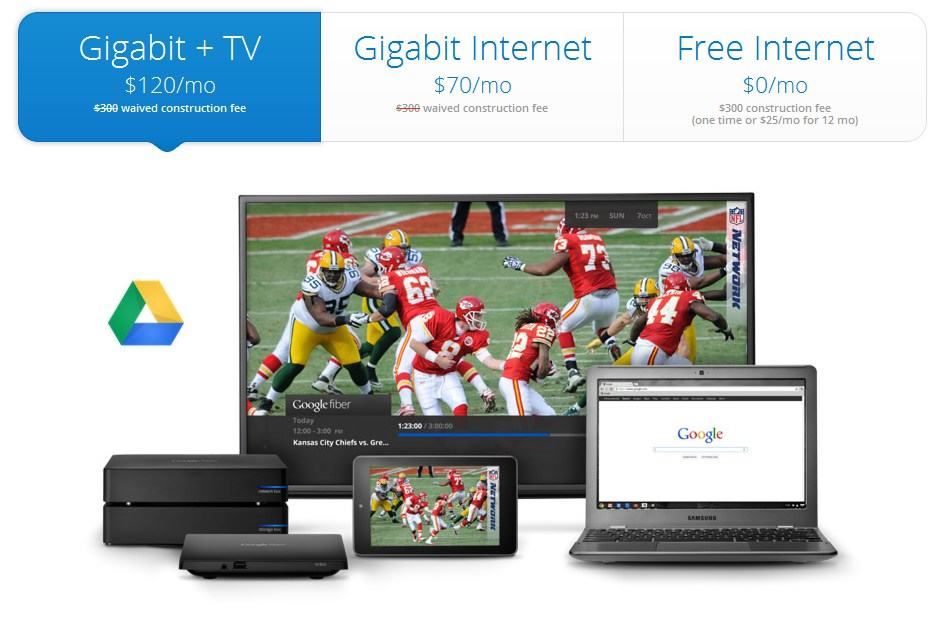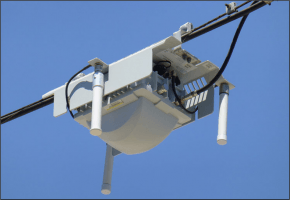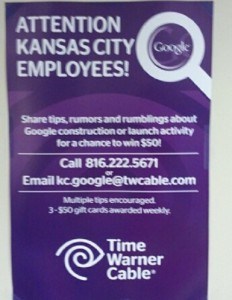 Google formally announced its new fiber to the home service to residents of Kansas City today with game-changing pricing for broadband and television service.
Google formally announced its new fiber to the home service to residents of Kansas City today with game-changing pricing for broadband and television service.
For $70 a month, Google will deliver consumers unlimited 1Gbps broadband service. For an additional $50 a month, customers can also receive a robust television package consisting of hundreds of digital HD channels, and throw in a free tablet (they call it ‘the remote control’), free router, free DVR with hundreds of hours of storage, and access to Google’s cloud backup servers.
Google has also found a solution to affordable Internet for poorer residents. The company is promising free 5/1Mbps service for up to seven years if customers will pay a $300 installation charge, payable in $25 installments.
Customers who agree to sign up for multiple services and a service contract can waive the $300 installation charge.
Google’s new service will roll out to different areas of Kansas City. Google has split neighborhoods into “fiberhoods” that consist of around 800 homes. In a masterful public relations and public policy demonstration, Google intends to show up the cable and phone companies who have repeatedly declared customers have no interest in fiber-fast broadband speeds by asking would-be customers to pre-register for Google Fiber, which will cost $10. Those “fiberhoods” with the largest number of pre-registrations will be the first to get Google’s new fiber service. At least 80 families (around 10%) of each “fiberhood” will have to be willing to sign up for Google to activate the service in each neighborhood.
Google hopes consumers will evangelize the possibilities of fiber broadband with friends and neighbors nearby and get them on board. If the telecom industry’s predictions of lukewarm interest are true, then Google won’t collect many $10 registrations and will not be able to publicize the number of customers who want nothing more to do with incumbent cable and phone companies. If Google is correct, they will have successfully proven America’s phone and cable companies have been dramatically overcharging Americans for service and large numbers are clamoring for a better choice.
[flv width=”640″ height=”380″]http://www.phillipdampier.com/video/Google Fiber In Kansas City 7-26-12.flv[/flv]
Google’s formal introduction of Google Fiber in Kansas City this morning. Presentation begins at around the five minute mark. (1 hour, 6 minutes)
Google has the goods to entice technology fanatics. Those signing up for television service will find Google has moved way beyond the traditional cable set top box that still won’t reliably record your favorite shows. Google will supply customers with:
- a free Nexus 7 tablet that will come pre-programmed to function as a remote control (but can be used for other things);
- a Bluetooth-based traditional remote;
- a combination set top box and DVR system that can record up to 500 hours of programming;
- a Wi-Fi enabled Gigabit router;
- an iOS (Android coming, of course) app that will let viewers manage everything over their tablet or mobile phone;
- a 2TB storage locker;
- a free terabyte of Google Cloud storage
But Google’s current television lineup does omit many popular cable networks, either in an effort to control programming costs or because the company has not completed negotiations with every programmer they want on the lineup. Among the missing:
- ESPN and regional sports networks
- Disney networks
- Turner networks like TNT, TBS and Turner Classic Movies
- Rainbow Networks’ AMC
- Time Warner-owned channels like HBO, CNN and TruTV
- Fox-owned networks like Fox News Channel and Fox Business News
Time Warner Cable’s response to Google’s network seems to indicate, publicly at least, they are not that worried.
“Kansas City has been a highly competitive market for a long time and we take all competitors seriously,” said spokesman Justin Venech. “We have a robust and adaptable network, advanced products and services available today, and experienced local employees delivering local service. We are confident in our ability to compete.”


 Subscribe
Subscribe








